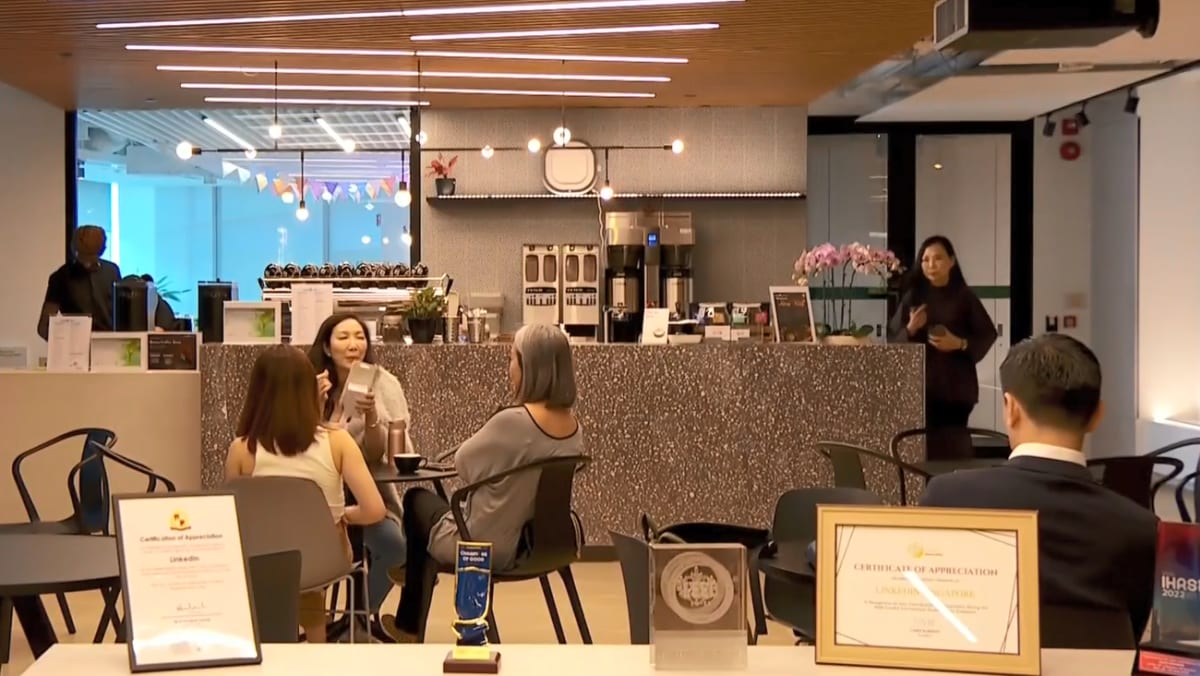SINGAPORE: At one firm in Singapore, employees’ moods are being monitored as they work, providing insights into when they feel stressed or focus best.
The study is part of real estate consultancy JLL’s efforts to boost mental health at the workplace.
Mr Ben Hamley, JLL’s Future of Work lead for Asia Pacific, noted that Southeast Asian countries including Singapore struggle with “quite a lot of stigma” surrounding mental health.
“The idea of being open and vulnerable about times that you might be struggling or feelings of mental ill health, anxiety and depression is very misunderstood,” he said.
“By giving people insight into the data around when they’re feeling stressed, when they are focused the most … I think we can actually start a much bigger conversation about mental well-being in the workplace all across Asia Pacific.”
He added that it is important to shape a dialogue in which people feel comfortable talking about their mental well-being.
JLL is working with bioinformatics firm Emotiv for the study.
The study aims to uncover factors that allow for optimal work experiences, such as ideal environments for creative tasks and the type of work conditions that can drive collaboration. At the same time, it hopes to use the data to turn the office into an uplifting space.
“We’re capturing neuroscientific brain data from individuals while they’re actually doing work as they normally would,” said Emotiv research scientist Nik Williams.
THE NEED FOR MENTAL WELL-BEING AT WORK
JLL’s push to improve work life comes amid studies showing the cost of poor mental health among employees and the benefits of paying attention to their well-being.
According to a recent McKinsey study, one in four employees worldwide is experiencing symptoms of burnout.
In Asia, that figure is one in three. The study found that poor workplace mental health can lead to costly organisational issues including absenteeism, lower engagement, decreased productivity and increased insurance costs.
In a CNA-commissioned survey of mental health across six Asian societies during the COVID-19 pandemic, Singapore was the only place where burnout was the leading factor affecting mental health.
This bucked the trend seen in the other places in the survey, where most people pointed to public measures to keep the pandemic under control, such as restrictions on mask-wearing and travel, and financial burden from the loss of income.
Mental health at the workplace is also on the World Health Organization’s (WHO) radar. WHO and the International Labour Organization recently called for concrete actions to address mental health concerns in the working population.
An estimated 12 billion workdays are lost annually due to depression and anxiety, costing the global economy nearly US$1 trillion (S$1.44 trillion).
Addressing well-being could help not just with the mental health of employees, but with productivity as well. A report by Mental Health Foundation UK found that doing so increases employee productivity by 12 per cent.
CREATING A CONDUCIVE ENVIRONMENT
While JLL has taken to data to improve things, another firm, networking platform LinkedIn, has focused on creating a workplace where staff have the space to unwind.
There are pool tables, table tennis tables and a gym where classes are offered. Employees are free to take a mid-day break in a way that suits them.
Ms Sumita Tandon, director of human resources for Asia Pacific at LinkedIn, said that the firm does a survey with employees every quarter and is “intentional” about asking questions on well-being.
From that survey, the company gleaned feedback specific to the office space, which it then took on board to make enhancements.
“We have received feedback about wanting to have more collaborative spaces in the office, or wanting to have more on-site wellness sessions when it comes to mindfulness, when it comes to dealing with young children,” she said.
With hybrid work life now prevalent in firms, LinkedIn also trained managers to deal with the new norm and identify early signs of mental health issues like depression and burnout, as well as fatigue, Ms Tandon added.
One employee who has benefitted is regional account director Madushan Alwis.
“I think taking a breather is something that’s really important, especially in a stressful job. It’s also important that there are suitable options for that. So over here, it could be taking a break, having a coffee with one of your colleagues or going for a mid-day yoga or meditation session,” he said.
“I think it’s important to be able to take 30 minutes to an hour to have that breather in between your workday when you want to create some space in your mind and come back with new energy to really handle the task at hand.”
Ms Tandon believes companies should continue to invest in their employees’ well-being.
“Companies should continue to invest, consult employees and make sure that what you’re doing is relevant for them, it resonates with them, and it’s helping them whether it is more programs to equip managers or whether it is changes to your physical workspace,” she said.





